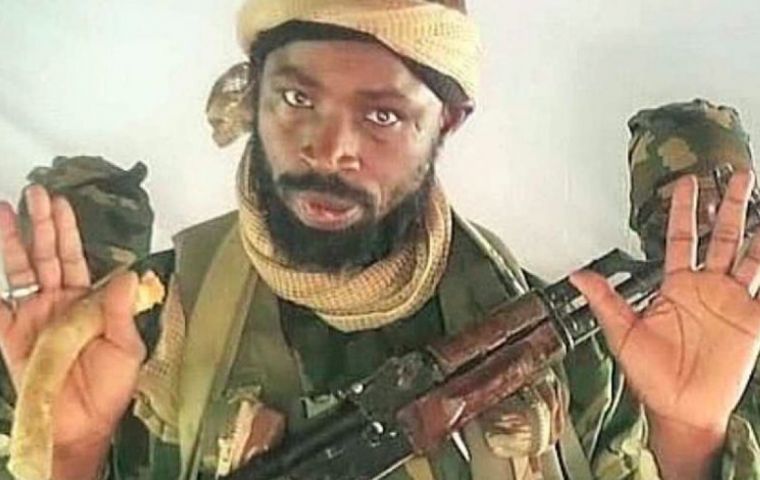MercoPress. South Atlantic News Agency
Nigerian Boko Haram guerrilla leader kills himself in fight against rival factions
 ”Shekau preferred to be humiliated in the hereafter to getting humiliated on Earth,” the audio said.
”Shekau preferred to be humiliated in the hereafter to getting humiliated on Earth,” the audio said. The leader of Nigeria's jihadist Boko Haram guerrillas Abubakar Shekau was involved in a firefight at his home during which he took his own life, it was reported Sunday, two weeks after the alleged incident.
An audio file released Sunday would indicate that Abubakar Shekau killed himself while fighting rival jihadists from the Islamic State West Africa Province (ISWAP). The Nigerian army said it was investigating the claim.
His death marks a major shift in Nigeria's 12-year-old jihadist insurgency which has left over 40,000 people dead and around two million displaced.
The incident also leaves the ISWAP as the dominant force in the region, although Boko Haram is yet to comment on the death of their leader.
“Shekau preferred to be humiliated in the hereafter to getting humiliated on Earth. He killed himself instantly by detonating an explosive,” said a voice resembling that of ISWAP leader Abu Musab Al-Barnawi, speaking in the Kanuri language.
The audio, which was not dated, was given to France's AFP news agency by the same source who conveyed previous messages from the group.
ISWAP described in the audio how it sent fighters to Boko Haram's enclave in the Sambisa forest, and that they found Shekau sitting inside his house and engaged him in a firefight. After finding him, ISWAP fighters urged him and his followers to repent, the voice added, but Shekau refused and killed himself.
“We are so happy,” the voice said, describing Shekau as “the big troublemaker, persecutor and destructive leader of the nation.” ISWAP split from Boko Haram in 2016, objecting to Shekau's indiscriminate targeting of Muslim civilians and use of women suicide bombers.
“This was someone who committed unimaginable terrorism and atrocities. For how long has he been leading people astray? How many times has he destroyed and abused people?” the voice said.
In the past two years, ISWAP emerged as the more dominant force in the region, carrying out large-scale attacks against the Nigerian military. As the group now looks to absorb Shekau's fighters and territory, Nigeria's army potentially faces a more unified jihadist force, analysts say.
But ISWAP may also struggle to control or persuade Boko Haram factions loyal to Shekau outside Sambisa, especially in border areas. “It may not be over yet,” one security source said. “ISWAP will have to subdue or convince these camps to coalesce [them] into its fold to fully consolidate its control.” Jihadist infighting may present opportunities for Nigeria's army to take advantage of.
But should ISWAP absorb part of Shekau's men and weapons, it might be in a position to cut off roads to and from the Borno state capital Maiduguri, said Peccavi Consulting, a risk group specialising in Africa.
Since 2019, Nigeria's army has pulled out of villages and smaller bases to hunker down in so-called “supercamps”, a strategy critics say allows jihadists to roam free in rural areas.
Following its takeover of Sambisa, ISWAP sent messages to locals in the Lake Chad region, telling them they were welcome to its self-declared “caliphate”, said Sallau Arzika, a fisherman from Baga. Locals were chased out of the lake islands after ISWAP accused them of spying for the military.




Top Comments
Disclaimer & comment rulesCommenting for this story is now closed.
If you have a Facebook account, become a fan and comment on our Facebook Page!